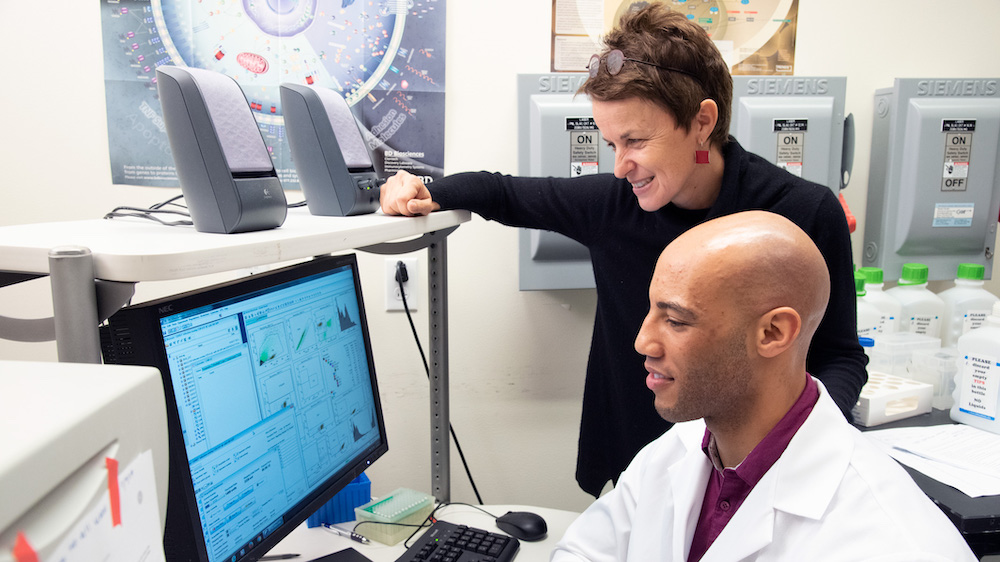Melanie Ott’s lab studies viruses that infect humans, and applies the lessons learned to new and emerging viruses. Founded at the peak of the AIDS epidemic, the lab has since broadened its scope from HIV to other viruses with global relevance such as hepatitis C virus, Zika virus, and SARS-CoV-2. The Ott Lab combines broad expertise—in virology, cell biology, biochemistry, systems biology, and chromatin biology—with a diverse and highly collaborative approach. They focus on human-host factors restricting or enabling viral infections, and build and study complex primary cell systems, such as organoids, to model physiological conditions closely. Ott’s team leads the HOPE Collaboratory, an NIH-funded multidisciplinary research consortium dedicated to eradicating HIV. The Ott lab also leads projects on respiratory virus infections in NIH-funded UCSF QCRG AViDD and HPMI programs.
Disease Areas
Areas of Expertise

Lab Focus
Research Impact
The Ott Lab has uncovered a number of ways in which viruses harness the biology of human cells to their own benefit and to the detriment of their hosts.
These findings pave the way for the development of therapies that target the virus-host interface.
For instance, the lab demonstrated the importance of non-histone protein acetylation in HIV transcription and latency, ushering in the use of drugs that block acetylation as a potential step toward the eradication of HIV. They discovered a major pathway explaining hepatitis C virus’s dependence on lipid droplets inside liver cells, and identified nonsense-mediated RNA decay as a new host defense against RNA viruses that is inactivated by Zika virus.
Since the beginning of the COVID-19 pandemic, Ott’s lab and collaborators developed a testing platform that detect SARS-CoV-2 RNA without amplification, using CRISPR/Cas13a and a mobile phone. The platform could be deployed for rapid molecular testing at home or at a point-of-care facility.
They have used genome-wide CRISPR screens to identify host pathways enabling the replication of SARS-CoV-2 and of common cold coronaviruses as the basis for new pan-coronaviral therapeutic strategies.
They have also characterized Delta, Epsilon, and Omicron variants with pseudotyped viruses, virus-like particles and full-length molecular clones to identify mutations in S and N proteins that increase viral spread.
Professional Titles
Director, Gladstone Infectious Disease Institute
Nick and Sue Hellmann Distinguished Professor, Gladstone Institutes
Senior Vice President, Gladstone Institutes
Professor, Department of Medicine, UC San Francisco
Director, Michael Hulton Center for HIV Cure Research
Bio
In Melanie Ott’s lab, the scientific goal is clear: We research the viruses of today to prepare for the viruses of tomorrow. Toward that end, she and her team are unraveling how viruses—including hepatitis C, HIV, SARS-CoV-2, and Zika—hijack human cells, and they are designing ways to thwart these pathogens.
A native of Germany, Ott earned her medical degree in 1991 from the University of Frankfurt/Main. During her neurology residency in Frankfurt, she watched an overwhelming number of people with HIV die for lack of a treatment or cure. Seeking answers, Ott moved to the U.S. to study HIV in the laboratory and earned her PhD from the Elmezzi Graduate School of Molecular Medicine at Northwell Health. Following a five-year stint leading her own lab at the German Cancer Research Center, and working closely with virologist and Nobel laureate Harald zur Hausen, Ott returned to the U.S. in 2002 to join Gladstone Institutes.
Here, in addition to her laboratory investigations, Ott directs the global HOPE (HIV Obstruction by Programming Epigenetics) Collaboratory, which seeks to both silence and permanently remove HIV from the body. She also lends her scientific expertise to the council of the National Institute of Drug Abuse (NIDA) and to the FDA’s Cellular, Tissue, and Gene Therapies Advisory Committee. For InvisiShield Technologies Ltd, a company developing therapeutics to prevent respiratory infections, she chairs the scientific advisory board.
Always a proponent of opening laboratory doors to any student interested in science, Ott founded the PUMAS summer internship program at Gladstone, for which she has received much recognition.
What are you most excited about in your lab right now?
“I am truly excited about the incredible motivation and dedication of my lab, the sense that our work is making a difference in people’s lives and the speed with which we can now progress from viral genotype to disease phenotype. Our rapid reverse genetics technology allows us to safely study any viral variant, its replication capacity and ability to cause disease in less than 2 weeks, and is widely shared with our colleagues.”
Honors and Awards
2020 Named one of the Most Influential Women in the Bay Area by "San Francisco Business Times"
2020 Inspire Award, "San Francisco Business Times"
2019 NIH Merit Award, National Institutes of Health
2018 UCSF AIDS Research Institute Award for Outstanding Teaching and Mentoring
2018 Elected fellow, American Academy of Microbiology
2017 Pantheon Award: Biotechnology Educator of the Year, California Life Sciences Association
2014 Avant-Garde Award, National Institutes of Health
2013 Elected member, Association of American Physicians
2008 Thomas N. Burbridge Award, UC San Francisco
2008 UCSF Chancellor’s Award for Public Service, UC San Francisco
2000 Young Researcher Award, European Conference on Experimental AIDS Research, Madrid, Spain
Publications
Contact
Melanie Ott
Email
415.734.4807
Alia Aguilar
Administrative Associate
415.734.2725
Email

